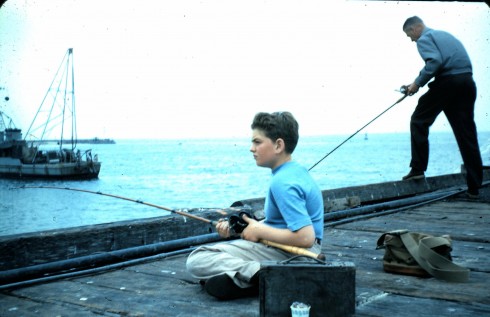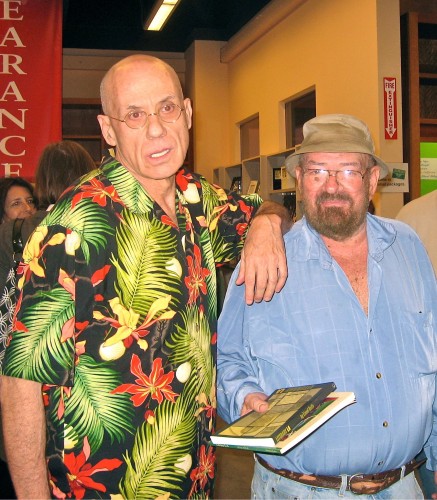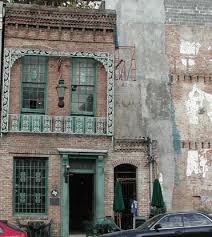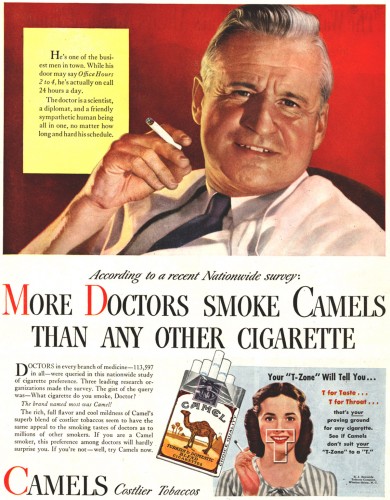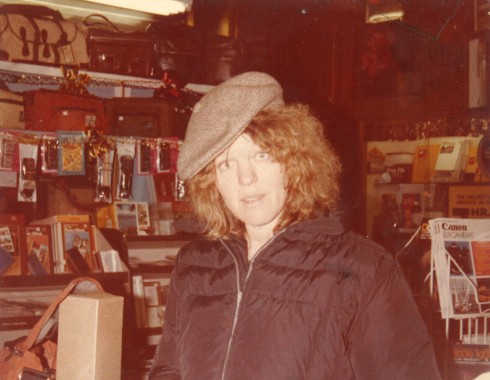The Author As A Young Fisherman At The Santa Monica Pier, Taken No Doubt In The Early ’50s
& Many Years Later, Lionel Is Hanging Out With The Likes Of James Ellroy
MEMORABLE SUMMER NIGHT RENDEZVOUS’ AT LA CARAFE
La Carafe Building (circa 1860)– Houston, Texas
By Bob Vickrey
I sometimes sit in a little French café across the street from my house in Southern California enjoying my breakfast while listening to the piped-in music of Edith Piaf, and become quickly transported back to my college years where I first heard the haunting La vie en rose.
The rundown musty old bar in Houston was called La Carafe, and for several summers in the heyday of the 1960s, it provided the perfect meeting place for many of my former high school pals.
I remember the first night I entered the dark, mysterious La Carafe and promptly spotted several friends who were being regaled with stories by the bartender. I was immediately struck by the number of beautiful women in the room who all seemed to be speaking French. The international flavor of the place was quite a novelty for those of us that had barely crossed state borders. Read more
MY KINDLE, MY BIRDS & ME
By LIONEL ROLFE
After several years of deliberation, I finally purchased a Kindle. I now own my very own digital reading device which has all the books I can read on it. There’s lot that’s unsettling about the device, but that’s not entirely bad—just caused a bit soul searching. Getting the Kindle turned out to be a really big deal for me, and a revelation. For one thing, I realized how much I was an old man living through revolutionary times.
I am preparing for exiting this vail of tears, not right away, I hope, but soon enough. I’m stumbling down the last league. As a result, I no longer feel a compulsion to be on the cutting edge. I’ve lived long enough to see too many cutting edges come and go. One of the things that my friends know about me is that I’m quaint in my appreciation of music. I grew up turning pages for my concert pianist mother, especially when she played the Kreutzer. I played classical guitar until I was 13 or so and haven’t touched an instrument since.
But music never lost its magic. I just felt that there were others who could give it that magic better than I. When I got into my late teens, Jazz proved intriguing. Folk, blues, and the very greatest voices like Paul Robeson and Edith Piaf turned me on. Rock never made the cut. I rarely heard that much genuine genius in it, and mostly I saw it as an essentially corporate product. When Bob Dylan electrified his guitar, I lost interest. Read more
CHAPTER 11 “TOKEN GESTURES” FROM UMBERTO TOSI’S NOVEL, OUR OWN KIND
(Umberto Tosi, author of Ophelia Rising, was an editor and staff writer for the Los Angeles Times from 1959-1971.)
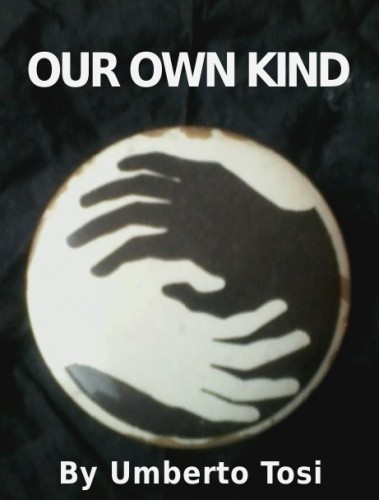 Roy Wolfe slides onto the barstool next to Benny and lights a Camel. “Gotta quit these things.”
Roy Wolfe slides onto the barstool next to Benny and lights a Camel. “Gotta quit these things.”
“More doctors smoke camels than any other cigarette.” Gordon feeds the line.
“He’d walk a mile for a Camel,” Benny cues off the ad that actually had just flashed on the muted bar TV, and bums one off Roy.
Roy acknowledges Gordon with a sidelong glance, elbows Benny, gives him a fag and lets him light up off of his. “Fraternizing with the enemy again, Benny?” Smoke envelopes them in a blue-gray twilight like doomed doughboys in World War I trenches.
Camel Cigarette ad from the period, with slogan quoted in Nino’s text
Roy reminds Benny of a younger Nat King Cole, with high forehead, sculpted cheekbones and an easy, kind of sexy smile, but a gravelly voice. He doesn’t trust himself to say that to anyone, for fear it will sound like he thinks all black people look alike.
Maybe. Benny is white, after all – a whiter shade of pale. Procol Harum’s pseudo-psychedelic one-trick hit gives Benny a contact high and a case of hives, because he has to grit his teeth and give a shit-eating smile whenever people mention the title as a cool way of letting him know they notice he’s an albino.
“Yeah? Well then, where are my 16 vestal virgins?” Read more
Chapter 21, The Latest Exciting Chapter From Mary Reinholz’s “Exit from Eden”
the author back in the day
Chapter 21
Around 2 am I drifted into a fitful sleep. Sargeant Battaglia and Doria Nune appeared in my dreams wearing clown costumes in a mirrored funhouse, their privates exposed like overripe fruit. Battaglia advanced with his night stick raised, about to arrest me for killing a rapist in Arkansas.
It was around 7 o’clock when I woke up, convinced that Doria had given her pot-smoking cop lover the number of my room which was only two floors down from hers at the Chelsea Hotel. It was time to get out of this pitstop in my fugitive’s life before Battaglia came banging on my door —maybe with a search warrant and his other gun drawn.
Frantically I rummaged through my wallet and found Dr. Grobnik’s card with the name of Danny Schultz on the back. During the business hours, I would call Schultz about the apartment Grobnik said he wanted to sublet. I needed to get out of The Chelsea—away from Doria and her scene, away from the junkies leaving blood and vomit in the communal toilet outside my fourth floor room, away from the squalid horror of Battaglia who was more dangerous than any addict in this boho hotel.
At least the sun was shining brightly in the early winter morning. I slipped into jeans and a thick sweater and walked out into the nearly vacant street. A half block east towards 7th Avenue, I bought a copy of The Daily Bugle at a newsstand and read it over my first cup of coffee at the nearby Horn & Hardart automat.
The double murder of Vinnie DeQuattro and his still unidentified mob associate was front page news with my pictures of the two slain wise guys splattered across the cover, the headline in red ink. Ted Katz and I shared a byline just as Katz had promised. There, on page three where our story continued, was an artist’s sketch of the burly hit man with a pullout description of how he strode military style towards his targets wearing gray sweat pants and holding a .38 revolver. And there was my pen name—C.J. Ryder—standing alone for the photo credits. Read more
California Nightmares
NOTES FROM ABOVE GROUND
By Honey van Blossom
(Honey is a Belgian Marxist former strip-tease artiste)
The Tenderloin is a neighborhood in downtown San Francisco between the Union Square shopping district to the northeast and the Civic Center office district to the southwest. It encompasses about 50 square blocks. It overlaps the theater district. By the 1920s, the neighborhood was famous for speakeasies, billiard halls, boxing gyms – background for the fiction of Dashiell Hammett, who lived at 891 Post Street. Both the movie and the book The Maltese Falcon were set in the Tenderloin.
Squalid conditions, homelessness, crime, illegal drug trade, prostitution, dive bars and liquor stores give the neighborhood a seedy reputation. Violent crimes and thefts from parked vehicles are common.
The densest cluster of human dung in San Francisco is in the notoriously filthy North of Market-Tenderloin Community Benefit District. BART escalators on Market close from time to time to remove human excrement. The Mission District, Chinatown and western Haight-Ashbury host significant shit deposits. You have to watch your step as well South of Market between Fifth and Seventh Streets. Read more

